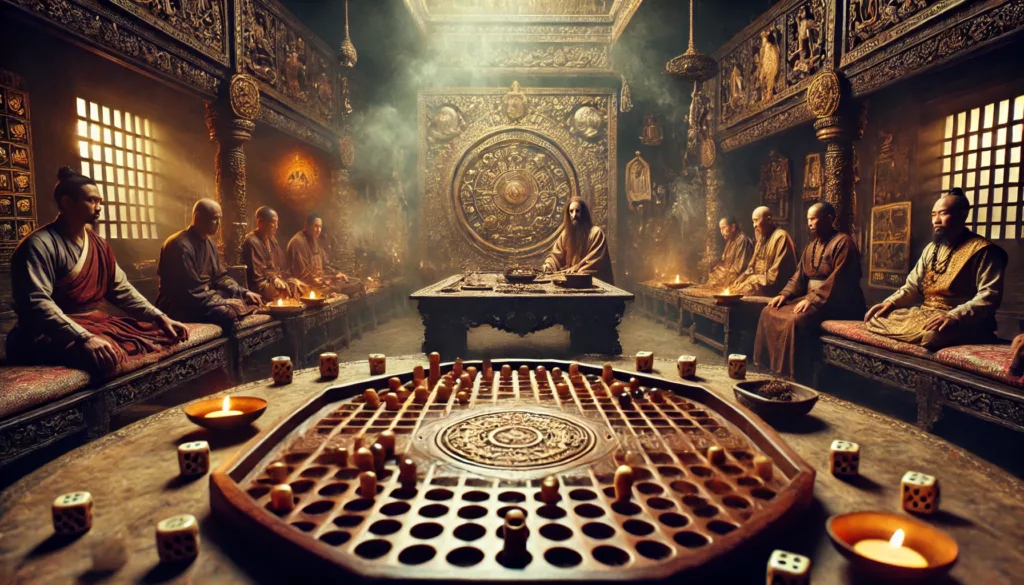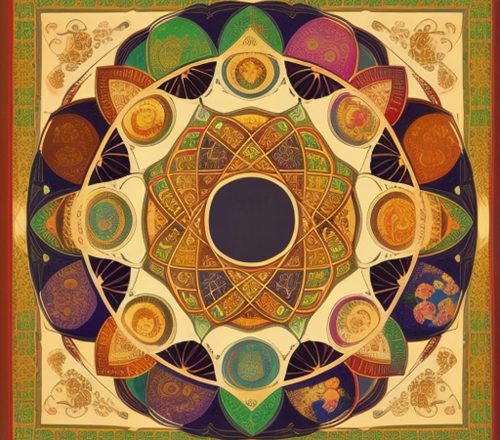
Table of Contents
Aka Game of Hounds and Jackals
The game of 58 holes transcended mere recreation. The board and its pieces also played a part in divination and funerary rituals. In these contexts, the roll of dice or knucklebones, which dictated the movement of pegs or pawns, was interpreted as a manifestation of divine will. Such practices were not uncommon.
The game of 58 holes
The ancient game of 58 holes, often referred to as the Game of Hounds and Jackals, offers a compelling glimpse into how recreational activities can intertwine with spirituality and ritualistic practices. This game, dating back to around 2000 BCE, was not merely a pastime but also held significant cultural and religious implications, particularly in the ancient Near East.
Origins and Rules of the Game
The Game of 58 Holes, discovered in archaeological sites like Thebes and Mesopotamia, was played on a wooden board that featured two sets of holes—29 for each player—arranged in a peculiar pattern. Players used pegs or pawns and moved them across the board based on the roll of dice or knucklebones, aiming to be the first to traverse all 58 holes. The specific rules of play have been reconstructed through careful study of surviving artifacts and ancient texts, suggesting a combination of strategy and chance.
Beyond Recreation there is Divination and Funerary Practices
While the game itself was a source of entertainment, its significance extended far beyond recreation. In many ancient cultures, the outcome of games was often seen as influenced by the divine. The roll of the dice or knucklebones in the Game of 58 Holes was interpreted as a manifestation of divine will, guiding the players’ actions and decisions. This belief in divine intervention made the game a tool for divination, where the movements of the pieces were thought to reveal insights or predict future events.
Divination
Divination, the practice of seeking knowledge of the future or the unknown by supernatural means, was an integral part of many ancient cultures. The Game of 58 Holes was no exception. The randomness of the dice rolls was seen as a conduit for divine messages. Players and observers believed that the gods communicated their will through the game’s outcomes, providing guidance on personal and communal matters. This practice elevated the game from a simple board game to a medium for divine consultation.
Funerary Rituals
The Game of 58 Holes also held a significant place in funerary rituals. Board games were often placed in tombs, reflecting the belief that they could provide entertainment and companionship for the deceased in the afterlife. The presence of such games in burial sites, like those at the Temple of Inshushinak at Susa, underscores their importance in the journey of the soul beyond death.
The Temple of Inshushinak, located in the ancient city of Susa in modern-day Iran, was a significant religious center dedicated to the Elamite god Inshushinak. Archaeological excavations at this site have unearthed several board games, including those resembling the Game of 58 Holes. The inclusion of these games in the temple’s context suggests their role in religious ceremonies and their symbolic value in the afterlife beliefs of the Elamites.
The Intersection of Play and Sacred
The dual nature of the Game of 58 Holes—both as a source of amusement and a sacred tool—highlights the multifaceted role of games in ancient societies. This intersection of play and sacredness is not unique to the Game of 58 Holes but is a common theme across various cultures and epochs. Games often served as metaphors for life’s journey, struggles, and the human desire to understand and influence fate.
Comparative Cultural Practices
Similar practices can be observed in other ancient civilizations. For instance, the Egyptian game of Senet, one of the oldest known board games, was also believed to have a divine aspect. The game was associated with the afterlife, with its depictions found in tomb paintings and its boards placed in graves. The roll of the dice in Senet was seen as influenced by the gods, guiding the deceased through the challenges of the afterlife.
In ancient Greece, the game of Petteia, also known as Poleis, was not only a form of entertainment but also had philosophical and strategic implications, reflecting the Greeks’ love for wisdom and strategy. The outcomes of such games were often interpreted as a reflection of the players’ virtues and the gods’ favor.
Modern Interpretations and Legacy
The legacy of the Game of 58 Holes and its counterparts in other cultures continues to fascinate historians and enthusiasts of ancient games. Modern interpretations often focus on the symbolic meanings and cultural significance of these games, providing insight into the values and beliefs of ancient civilizations.
In contemporary times, the study of ancient games like the Game of 58 Holes offers a unique perspective on the human experience. It reveals how societies across history have sought to understand the world around them through play, ritual, and the interpretation of chance. These games are not merely relics of the past but are testament to the enduring human quest for meaning, connection with the divine, and the navigation of life’s uncertainties.
Conclusion
The Game of 58 Holes exemplifies the profound role that seemingly mundane activities can play in the spiritual and cultural life of a society. By transcending mere recreation, this game became a medium through which ancient peoples sought divine guidance and prepared for the afterlife. The artifacts found in the Temple of Inshushinak at Susa and other archaeological sites underscore the deep interconnection between play, ritual, and belief in the ancient world, reminding us of the timeless nature of these human pursuits.
Enjoy the readings! Thanks for shares and comments ?
Take time to learn
Invest in your future
Embark on a journey into the realm of affiliate marketing and craft your own website within a vibrant, supportive community. Join me in this adventure, where you can begin as a free starter and stay as long as you desire. Enjoy complimentary hosting and foundational teachings to set you on your path. For those with advanced skills, opportunities to elevate your expertise await. Take a moment to explore and witness the magic for yourself!




